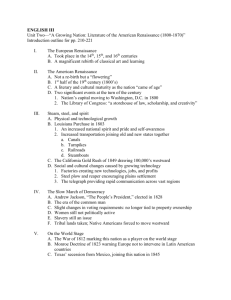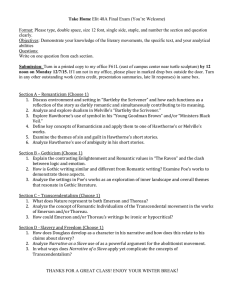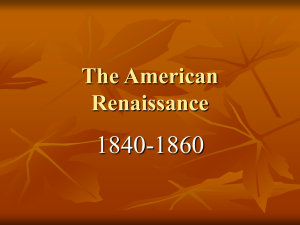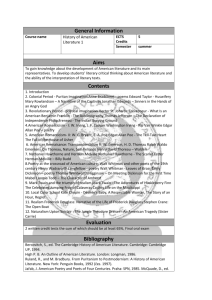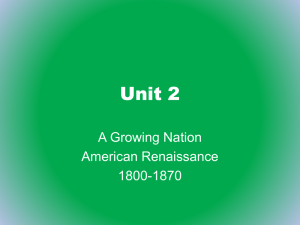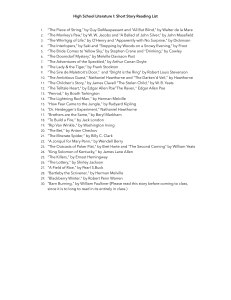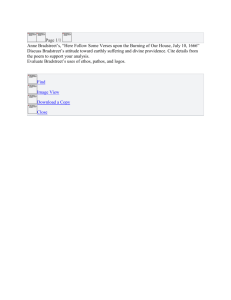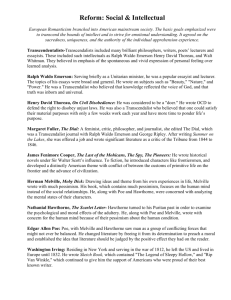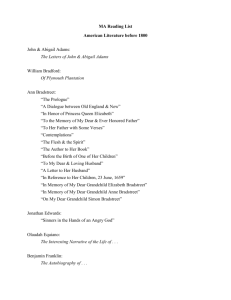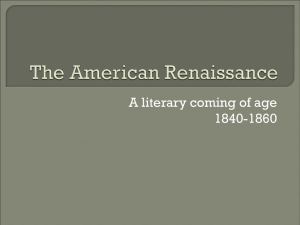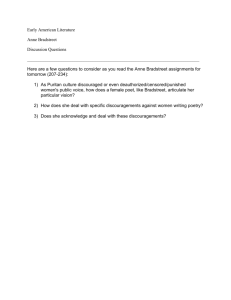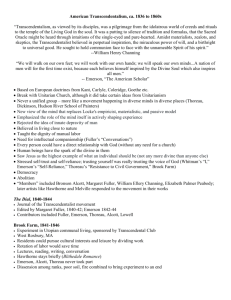American Literature I
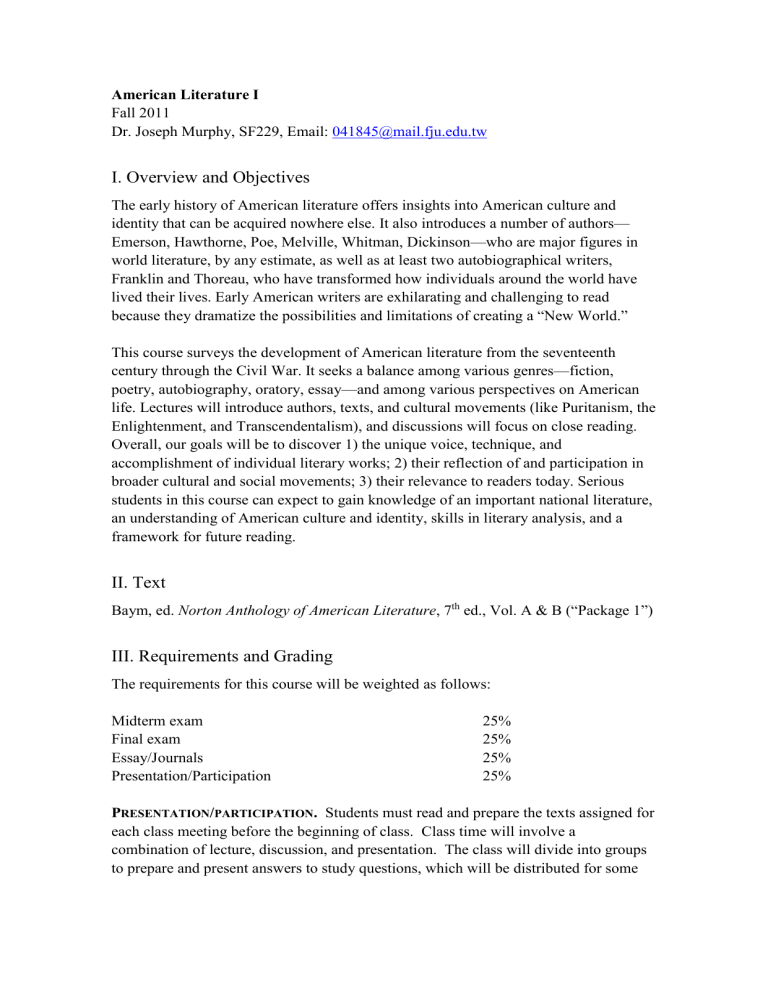
American Literature I
Fall 2011
Dr. Joseph Murphy, SF229, Email: 041845@mail.fju.edu.tw
I. Overview and Objectives
The early history of American literature offers insights into American culture and identity that can be acquired nowhere else. It also introduces a number of authors—
Emerson, Hawthorne, Poe, Melville, Whitman, Dickinson—who are major figures in world literature, by any estimate, as well as at least two autobiographical writers,
Franklin and Thoreau, who have transformed how individuals around the world have lived their lives. Early American writers are exhilarating and challenging to read because they dramatize the possibilities and limitations of creating a “New World.”
This course surveys the development of American literature from the seventeenth century through the Civil War. It seeks a balance among various genres—fiction, poetry, autobiography, oratory, essay—and among various perspectives on American life. Lectures will introduce authors, texts, and cultural movements (like Puritanism, the
Enlightenment, and Transcendentalism), and discussions will focus on close reading.
Overall, our goals will be to discover 1) the unique voice, technique, and accomplishment of individual literary works; 2) their reflection of and participation in broader cultural and social movements; 3) their relevance to readers today. Serious students in this course can expect to gain knowledge of an important national literature, an understanding of American culture and identity, skills in literary analysis, and a framework for future reading.
II. Text
Baym, ed. Norton Anthology of American Literature , 7 th
ed., Vol. A & B (“Package 1”)
III. Requirements and Grading
The requirements for this course will be weighted as follows:
Midterm exam 25%
Final exam
Essay/Journals
Presentation/Participation
25%
25%
25%
P RESENTATION / PARTICIPATION . Students must read and prepare the texts assigned for each class meeting before the beginning of class. Class time will involve a combination of lecture, discussion, and presentation. The class will divide into groups to prepare and present answers to study questions, which will be distributed for some
2 readings. These groups will also be responsible for a 20-25 min. presentation on one of the topics listed in the schedule.
A
TTENDANCE
and promptness are essential to this course. Absences, or persistent lateness, will hurt your grade. Students with more than three absences will fail this course . Two late arrivals or early departures constitute one absence.
IV. Tentative Schedule
Date Topic/Assignment
9/15 U NIT O NE : E XPLORATION , C OLONIZATION , P URITANISM
Introduction
Film: The Crucible (based on the play by Arthur Miller)
9/22 Columbus, Letters
Harriot, from A Brief and True Report of the New Found Land of Virginia
Bradford, from Of Plymouth Plantation
Winthrop, from “A Model of Christian Charity,” Journals
Mather, from Wonders of the Invisible World
9/29
Bradstreet, “The Flesh and the Spirit,” “The Author to Her Book,” “Before the Birth of One of Her Children,” “To My Dear and Loving
Husband,” “A Letter to Her Husband, Absent upon Public
Employment,” “In Memory of My Dear Grandchild Elizabeth
Bradstreet,” “On My Dear Grandchild Simon Bradstreet”
Taylor, Meditations 8 and 16; Preface to God’s Determinations ; “Upon
Wedlock, and Death of Children,” “[When] Let by Rain” “Huswifery”
P RESENTATION 1: Anne Bradstreet
10/6 Rowlandson, Narrative of the Captivity and Restoration of Mrs. Mary
Rowlandson , Opening narrative, First, Second, Third, and Twentieth
10/13
Edwards, “Personal Narrative”; “On Sarah Pierpont”; “A Divine and
Supernatural Light”; “Sinners in the Hands of an Angry God”; “The
Beauty of the World”; from Images or Shadows of Divine Things
Removes
P
RESENTATION
2: Salem Witch Trials, 1692
10/20 U
NIT
T
WO
: R
EVOLUTION AND
E
ARLY
R
EPUBLIC
Franklin, from Autobiography
P
RESENTATION
3: Benjamin Franklin
10/27 Crevecoeur, Letters from an American Farmer , Letter III
John Adams and Abigail Adams, Letters
Jefferson, from The Autobiography of Thomas Jefferson and Notes on the
State of Virginia , Queries V, XIX
Wheatley, “On Being Brought from Africa to America,” “To the Right
Honorable William, Earl of Dartmouth”
P
RESENTATION
4: Phillis Wheatley
11/3
Irving, “Rip Van Winkle”
Hawthorne, “My Kinsman, Major Molineux”
P
RESENTATION
5: Washington Irving
11/10 Midterm Exam
11/17 U
NIT
T
HREE
: T
RANSCENDENTALISM
Emerson, from Nature
; “Experience”
11/24 Thoreau, from Walden
P
RESENTATION
6: Henry David Thoreau’s Civil Disobedience and Its
Influence
12/1 U NIT F OUR : O THER A MERICAN R OMANTICS
Whitman, Preface to Leaves of Grass
; “Song of Myself”; “Crossing
Brooklyn Ferry”; “Out of the Cradle Endlessly Rocking”;
Emerson, “The Poet”
12/8
Hawthorne, “Rappaccini’s Daughter”
Melville, “Bartleby, the Scrivener”
P
RESENTATION
7: Herman Melville
12/15
Poe, “The Raven”; “The Man of the Crowd”; “The Tell-Tale Heart”
P RESENTATION 8: Edgar Allan Poe
12/22 Dickinson, #258, 303, 315, 328, 341, 448, 449, 465, 501, 520, 528, 632,
709, 712, 986, 1078, 1099, 1129, 1182; Letter [My Business is
Circumference]
12/29 U NIT F IVE : A H OUSE D IVIDED
Douglass, Narrative of the Life
P RESENTATION 9: Slave Narratives
1/5 Lincoln, Gettysburg Address, Second Inaugural Address
Whitman, “When Lilacs Last in the Dooryard Bloom’d”
P
RESENTATION
10: Abraham Lincoln, Slavery, and the Emancipation
Proclamation
1/12 Final Exam
3
